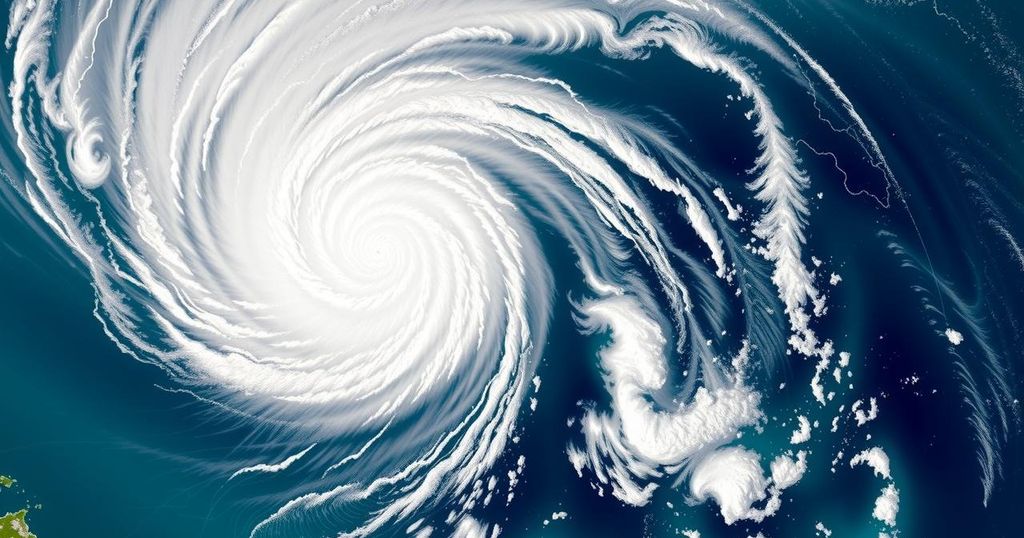Cyclone Chido is approaching the Indian Ocean islands of Comoros, Madagascar, and Mayotte, prompting emergency responses. Schools in Comoros have closed, and Mayotte has been placed on red alert. Mozambique has issued a red alert for affected regions, anticipating impacts on over two million people as the cyclone is set to make landfall on Sunday. Previous cyclones have caused significant damage in the region, raising concerns about potential public health risks.
The Indian Ocean islands of Comoros, Madagascar, and Mayotte are preparing for the impending arrival of Cyclone Chido. This intense tropical storm is forecasted to approach the African east coast, with significant impacts anticipated. Comoros has already mandated the closure of schools in anticipation of the cyclone’s landfall early Saturday. Prior to that, Chido is expected to pass over the northern region of Madagascar, where emergency measures are underway to protect residents.
Mayotte, which is a French territory south of Comoros, is under red alert as issued by the French national weather service, indicating the highest possible level of warning. In connection, Mozambique has also declared a red alert for its northern provinces, Cabo Delgado and Nampula, highlighting the potential risk to over two million individuals as the cyclone approaches land on Sunday. Predictions indicate that winds could reach speeds of 200 kilometers per hour (124 mph).
Ana Cristina, director of the National Emergency Operations Center, stated, “We believe that we can initially start working with an estimate of around 2.5 million people in the provinces of Cabo Delgado and Nampula who may be affected and will need to be rescued.”
As a precaution, Madagascar has issued alerts through various media channels to inform residents of necessary precautions. In the northern region of Diana, which is expected to suffer the greatest impact, evacuations are taking place, with concerns that nearly 20,000 individuals could be affected. To respond to potential disasters, food supplies and emergency equipment, including water pumps and generators, have been dispatched since Tuesday.
The French government is actively sending additional support to Mayotte. This includes approximately 110 personnel comprising emergency workers from the mainland and firefighters from Reunion, along with three tons of emergency supplies, such as rescue specialists and search dogs.
The cyclone season, lasting from December to March, has historically brought severe weather events to the region, with previous cyclones, such as Idai and Freddy, causing extensive devastation. Experts indicate that climate change is exacerbating cyclone intensity. Crisis24, a risk management firm, has warned that Cyclone Chido poses risks of flooding and landslides, potentially leading to outbreaks of waterborne diseases like cholera, alongside dengue fever and malaria.
The anticipated impact of Cyclone Chido on the islands of Comoros, Madagascar, and Mayotte highlights the severe weather risks associated with the cyclone season in the Indian Ocean. The region has witnessed increasingly disastrous storms in recent years, raising concerns over preparedness and adaptive measures against climate-related challenges. The occurrence of intense cyclones not only threatens immediate safety and infrastructure but also poses long-term public health risks, particularly regarding waterborne and vector-borne diseases. The response from local governments and international aid agencies reinforces the need for coordinated disaster management strategies.
In summary, Cyclone Chido poses significant threats to the Indian Ocean islands of Comoros, Madagascar, and Mayotte, with broad implications for safety, infrastructure, and public health. Authorities have enacted emergency measures, highlighting the urgency of preparedness in the face of impending natural disasters. As the cyclone approaches, collaborative efforts from local and international entities are crucial to mitigate the storm’s impact and safeguard the affected populations. The growing intensity of cyclones signals an urgent need to address the root causes associated with climate change.
Original Source: abcnews.go.com






